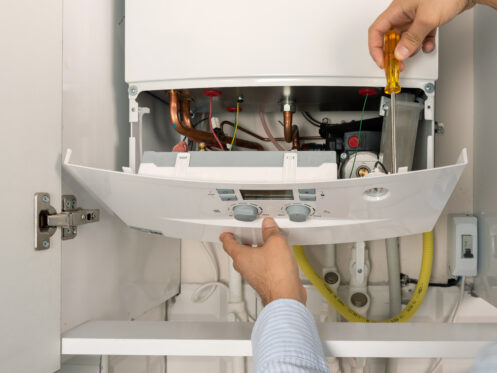When your water heater starts acting up, you’ll need to decide between repair and replacement. With so many choices, like gas, propane, and heat pump water heaters, it can be hard to make a decision. But making the right choice is important for your comfort and your wallet.
Different Types of Water Heaters
The type of water heater that you have will largely impact whether you choose repair or replacement. Gas and propane water heaters are the most common, and for good reason—they’re typically more affordable to install and operate. These machines use a gas burner to heat water quickly and efficiently. They’re great for households that need hot water on demand, such as for large families or homes with high water usage. However, the downside is that gas and propane heaters tend to consume more energy, which can lead to higher utility bills over time.
On the other hand, heat pump water heaters are becoming more popular because they use a lot less energy. Rather than generating heat, heat pump systems extract heat from the air around them to warm the water. This process uses significantly less electricity compared to traditional electric water heaters and is much more environmentally friendly. Though they come with a higher upfront cost, the long-term savings on energy bills can make them a more cost-effective choice over time.
Each type of water heater has its pros and cons. If your gas or propane unit is relatively new and working well, repairs might be all you need. But if it’s older and showing signs of wear, replacing it with a more efficient heat pump system could be a smart move. Understanding your unit’s type will help you make the best decision based on both immediate and long-term needs.
When to Repair Your Water Heater
Repairing your water heater can make sense if the issue is minor and the unit isn’t too old. For example, if your gas or propane heater isn’t producing enough hot water, it could be as simple as a thermostat malfunction or a clogged burner. In these cases, a quick repair could get your unit back to working efficiently without needing to replace the entire system.
Small leaks or broken valves may also be fixable with a straightforward repair. Often, these issues are localized to specific parts of the heater, and replacing or fixing those parts is far cheaper than replacing the entire unit. If your water heater is under 10 years old and the issue is something like sediment buildup or a faulty thermostat, a repair could easily solve the problem and extend the life of the unit by several more years.
When to Replace Your Water Heater
If your water heater is nearing the end of its lifespan—typically 10 to 15 years for gas and propane units and 10 to 20 years for heat pump systems—you might want to consider replacing it rather than repairing it. As water heaters age, the likelihood of major problems increases. Parts start wearing out, and inefficiency becomes more common. In some cases, the cost of repairs for older units might be close to the price of a new water heater.
Another sign that it’s time to replace your water heater is if repairs have become frequent. If you’ve had to replace parts regularly over the past couple of years, it could be an indication that the system is no longer reliable. Constant repairs also add up over time, and a new unit could save you money in the long run.
For heat pump water heaters, if your unit has stopped working altogether and the cost of repair is high, replacement is usually the better option. Though heat pump systems are designed to last longer, when they do break down, repairs can be pricey because of the complex technology. Replacing the system could be more economical than continuing to invest in repairs.
Cost Considerations
One of the first things you’ll think about when deciding whether to repair or replace your water heater is cost. While repairing a water heater is generally cheaper than replacing it, the cost of a repair can vary depending on the issue. Small repairs may only cost a few hundred dollars, while larger issues, such as replacing the heating element or burner assembly, can cost more. In contrast, the cost of replacing an old water heater can be several thousand dollars, especially if you’re upgrading to a more energy-efficient model or switching from gas to electric.
Long-term savings can also be a factor in your decision. Newer water heaters, especially energy-efficient heat pump systems, often cost more upfront but can save you a lot of money on bills every year. If you’re considering replacing your unit with a more energy-efficient option, take a close look at how much you’ll save over time. This can help make up for the higher price of the replacement.
Signs That Your Water Heater Needs Help Immediately
Some signs indicate that a water heater should be replaced immediately. If you notice a significant increase in your water bills, your system is working harder than it should. Older systems or units that have developed internal things like a cracked tank or a broken heat exchanger may consume more energy to perform the same tasks.
Another red flag is when the water quality changes. If your hot water becomes rusty or has a strange odor, it may mean that there is corrosion inside the tank. This is particularly common in older units, and when the tank begins to rust, it’s likely a sign that the system has reached the end of its useful life.
If your water heater is leaking, especially around the base of the unit, this is a sign of serious trouble. Small leaks might be repairable, but large or persistent leaks usually mean the tank has deteriorated and needs to be replaced. If you ignore this problem, it could cause a lot of water harm to your home.
Professional Installation
Whether you choose to repair or replace your water heater, professional installation is key to ensuring the system works efficiently. Water heaters can be tricky to install, and poor installation can lead to more problems down the line, such as inefficient heating or leaks. A professional will set up the system and make sure it is set up correctly, according to the manufacturer’s specifications and local building codes.
Additionally, installation is a great opportunity to consider upgrading your system. A professional can help you choose the best system for your home and lifestyle, whether you’re interested in reducing your energy bills or increasing hot water capacity. The right professional can guide you through the process, ensuring that your new or repaired water heater will last for years to come.
We Can Help You Decide
Making the decision to repair or replace your heat pump water heater doesn’t have to be stressful. With the right information and expert advice, you can choose the option that’s best for you and your home. If you’re still unsure, don’t hesitate to reach out to Cool Power LLC. Our team can help guide you through the process and find the best solution for your needs.
We also offer HVAC services that include air conditioning installation, air conditioning repair, and air conditioning replacement, as well as indoor air quality and custom maintenance packages.


